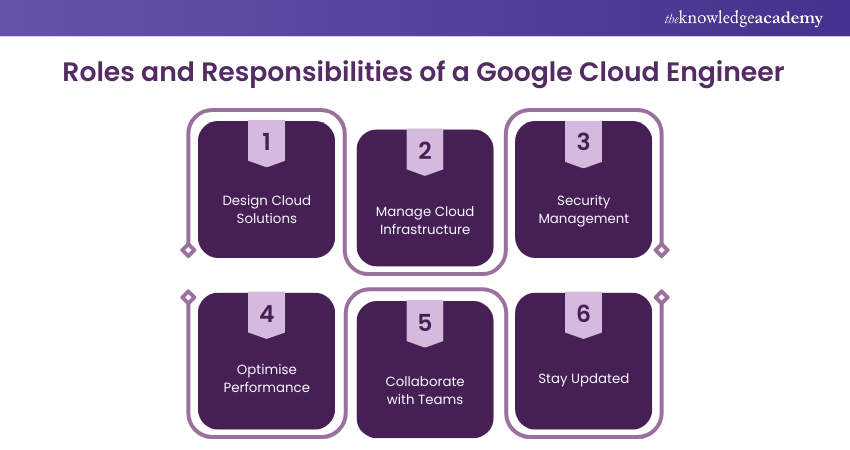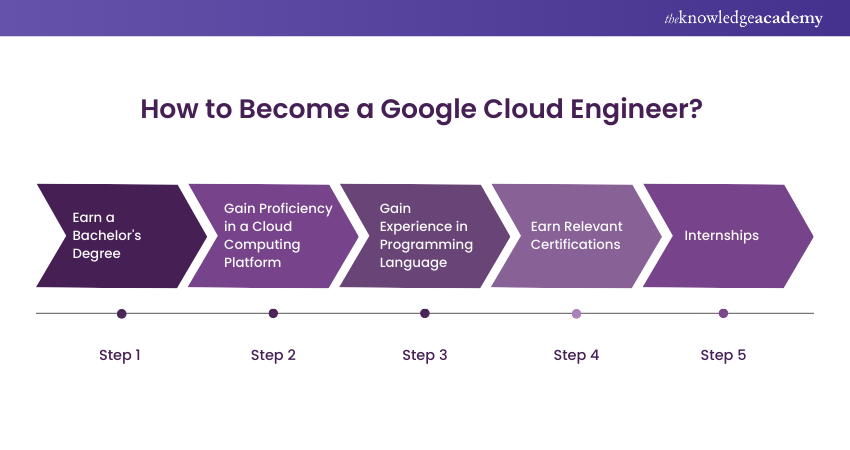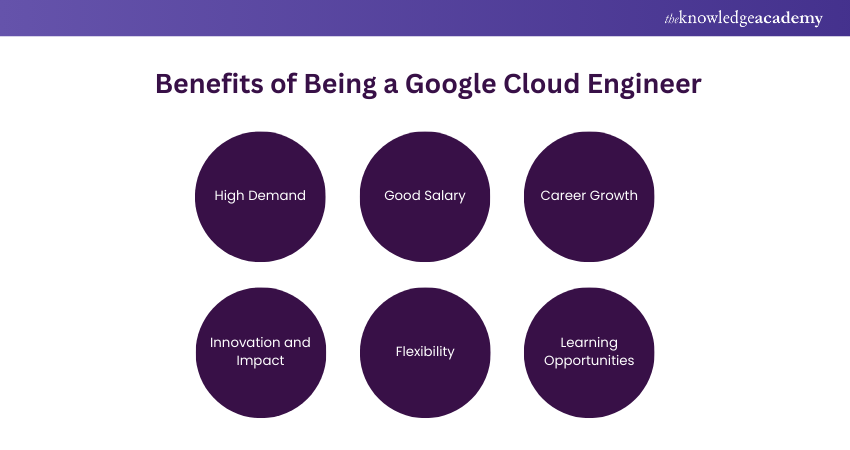We may not have the course you’re looking for. If you enquire or give us a call on + 1-866 272 8822 and speak to our training experts, we may still be able to help with your training requirements.
Training Outcomes Within Your Budget!
We ensure quality, budget-alignment, and timely delivery by our expert instructors.

Are you curious about the exciting world of Cloud Computing? If you’ve ever wondered How to Become a Google Cloud Engineer, you’re in the right place! Google Cloud Engineers are in high demand, helping businesses to use the power of the cloud to innovate and grow.
In this blog, we discuss the essential steps, skills, and certifications needed to become a successful Google Cloud Engineer. If you’re just starting out or looking to transition into a cloud-focused role, you will find valuable insights to help you succeed. Ready to dive into the cloud and transform your future? Let’s get started!
Table of Contents
1) Who is a Google Cloud Engineer?
2) Roles and Responsibilities of a Google Cloud Engineer
3) How to Become a Google Cloud Engineer?
4) Benefits of Being a Google Cloud Engineer
5) Template for Google Cloud Engineer Job Description
6) Conclusion
Who is a Google Cloud Engineer?
A Google Cloud Engineer is an IT professional who designs, develops, and manages applications and systems on the Google Cloud Platform (GCP). They ensure that cloud-based solutions are reliable, scalable, and efficient. They use GCP services to solve business problems and improve processes.
Additionally, they are responsible for implementing best practices for cloud security and performance optimisation. Google Cloud Engineers often collaborate with cross-functional teams to combine cloud solutions with existing systems and workflows.
Roles and Responsibilities of a Google Cloud Engineer
Here are the key duties of a Google Cloud Engineer:

a) Design Cloud Solutions: Create architecture for applications and systems using GCP services. Ensure the design meets business needs and technical requirements. Plan for scalability, reliability, and security in every solution.
b) Manage Cloud Infrastructure: Set up and maintain cloud environments, including Virtual Machines, storage, and databases. Regularly monitor system performance to identify and resolve issues quickly. Ensure the infrastructure runs smoothly and efficiently.
c) Security Management: Implement security measures to protect data and applications. Manage access controls to ensure only authorised users have access to resources. Regularly update security policies to comply with industry standards.
d) Optimise Performance: Improve the efficiency and performance of cloud applications. Use tools and techniques to monitor application performance and identify bottlenecks. Implement changes to enhance speed and reliability.
e) Collaborate with Teams: Work closely with developers, IT staff, and other stakeholders to deliver cloud solutions. Share knowledge and provide training on GCP tools and best practices. Ensure effective communication and collaboration across teams.
f) Stay Updated: Keep up with the latest GCP features and industry trends. Continuously learn about new technologies and integrate them into your work. Flexible to changes in the technology landscape to stay current and competitive.
Learn how to implement a storage bucket with our Google Cloud Storage Training – Join today!
How to Become a Google Cloud Engineer?

Becoming a Google Cloud Engineer means learning Cloud Computing skills and working with the Google Cloud Platform. This section will help you understand the steps, from starting with the basics to getting certified and finding a great job.
Step 1: Earn a Bachelor's Degree
The first step to kick-start any career is to obtain a bachelor's degree in a relevant field. This is especially true if your career requires technical knowledge. In this case, you will require a bachelor's degree in Computer Science. This will not only look great on your resume, but it also gives you a broad understanding of the subject knowledge you will require to be a Google Cloud Engineer.
Step 2: Gain Proficiency in a Cloud Computing Platform
Choose a cloud platform to focus on, like Google Cloud Platform. Learn how to use its core services, such as Virtual Machines, storage, and databases. Practice by working on small projects and using online tutorials and resources. This hands-on experience will help you become comfortable with the platform. Additionally, seek out community forums and groups to share knowledge and ask questions.
Step 3: Gain Experience in Programming Language
Learn a programming language like Python, Java, or Go. Practice writing code and building small projects. Use your programming skills to streamline tasks and develop applications. This experience will be valuable for working with cloud platforms and developing efficient solutions.
Step 4: Earn Relevant Certifications
There are various certification available to validate the skills of professionals within the Google Cloud ecosystem. Earning Google Cloud Certifications is a major accomplishment for those aiming to become Google Cloud Engineers.
Some of these certifications include Google Cloud Platform Fundamentals, Google Cloud Compute Engine, Google Cloud Storage, Google Cloud Firestore, and Google Cloud Developer.
Step 5: Internships
Irrelevant to the career path chosen, you are required to have some experience in the field to get employed, but how can you gain this experience? Internships! With a lot of work to manage, companies offer internships to freshers. This creates a win-win situation where you can gain valuable experience under the guidance of your employer while you help them with their tasks.
Ace your Google Cloud interview! Prepare with essential questions and expert tips. Get ready to impress with Google Cloud interview questions!
Benefits of Being a Google Cloud Engineer
Here are some of the advantages:

a) High Demand: They are in high demand as more companies move to the cloud. This trend creates many job opportunities in various industries. It also ensures a stable career with potential for growth.
b) Good Salary: Google Cloud Engineers earn competitive salaries due to the specialised skills required. The demand for their expertise makes them highly valued in the job market. This translates to better pay and benefits compared to many other IT roles.
c) Career Growth: There are many opportunities to advance into senior roles or specialise in areas like Security or Data Engineering. Continuous learning and gaining certifications can further boost career prospects. This field offers a clear path for professional development and advancement.
d) Innovation and Impact: They work on cutting-edge technology and innovative projects. Their work significantly impacts how businesses operate and grow. This allows them to be at the forefront of technological advancements and make meaningful contributions.
e) Flexibility: Many Cloud Engineering roles offer the option to work remotely. This flexibility in job location and working hours can greatly improve work-life balance. It allows professionals to tailor their work environment to their personal needs.
f) Learning Opportunities: Google provides a wealth of resources and training materials for Google Cloud Engineers. Continuous professional development is encouraged through certifications and hands-on projects. This ensures that Engineers are always learning and growing in their field.
Learn how to secure the security rules with our Google Cloud Firestore Training – Join today!
Template for Google Cloud Engineer Job Description
|
Job Title: Google Cloud Engineer (GCE) Location: [Company Location] Job Type: Full-time About Us: [Company Name] is at the forefront of leveraging cloud technology to drive innovation and efficiency. Our mission is to harness the power of Google Cloud Platform (GCP) to deliver reliable, scalable, and secure solutions. We value creativity, teamwork, and a commitment to continuous improvement. Job Summary: We are looking for a talented Google Cloud Engineer (GCE) to join our dynamic team. The candidate will have a passion for Cloud Computing and a strong desire to optimise and maintain our GCP infrastructure. This role involves designing, developing, and managing cloud solutions that support our business objectives. Key Responsibilities: • Designing cloud solutions using GCP services to meet business needs and technical requirements. • Setting up and maintaining cloud environments, including Virtual Machines, storage, and databases. • Implementing security measures to safeguard data. • Monitoring system performance, troubleshooting issues, and optimising cloud applications for efficiency. • Collaborating with developers, IT staff, and other stakeholders to deliver effective cloud solutions. • Providing support and training to team members on GCP tools and best practices. • Staying updated on the latest GCP features and industry trends and continuously learning new technologies. • Documenting processes, configurations, and incidents, preparing detailed reports for Senior Management. Qualifications: • Bachelor’s degree in Computer Science and Information Technology. • Proven experience with Google Cloud Platform and cloud infrastructure management. • Strong programming and scripting skills (e.g., Python, Java, Bash). • Excellent problem-solving and analytical skills. • Effective communication and collaboration skills. • Skill to manage multiple tasks and prioritise effectively. • Relevant certifications such as Google Cloud Associate Cloud Engineer or Professional Cloud Architect are a plus. What We Offer: • Competitive salary based on experience and qualifications. • Benefits package includes health, dental, and retirement plans. • Opportunities for professional growth and development. • A supportive and collaborative work environment. How to Apply: Submit your resume and cover letter to [email address] by [application deadline]. |
Conclusion
Understanding How to Become a Google Cloud Engineer opens doors to a rewarding career. By learning the basics, gaining experience, and obtaining relevant certifications, you can build a strong foundation in Cloud Computing. Keep up with the trends to improve your skills and stay ahead. The path to becoming a Google Cloud Engineer is both achievable and exciting. Embrace the journey and see your career take off.
Curious about a Google Cloud Engineer's salary? Discover earning potential, industry trends, and compensation insights. Explore Google Cloud Engineer salaries now!
Frequently Asked Questions

The salary of an Engineer in the UK ranges from £50,000 to £80,000 per year, based on experience and location. Senior Google Cloud Engineers can earn even more, often exceeding £100,000 annually. Certifications and specialised skills can also significantly impact salary levels.

Yes, working in the cloud is considered an IT job. Google Cloud Engineers use their knowledge of technology to manage and optimise cloud-based systems and applications. They play a major role in helping companies leverage cloud technology.

The Knowledge Academy takes global learning to new heights, offering over 30,000 online courses across 490+ locations in 220 countries. This expansive reach ensures accessibility and convenience for learners worldwide.
Alongside our diverse Online Course Catalogue, encompassing 17 major categories, we go the extra mile by providing a plethora of free educational Online Resources like News updates, Blogs, videos, webinars, and interview questions. Tailoring learning experiences further, professionals can maximise value with customisable Course Bundles of TKA.

The Knowledge Academy’s Knowledge Pass, a prepaid voucher, adds another layer of flexibility, allowing course bookings over a 12-month period. Join us on a journey where education knows no bounds.

The Knowledge Academy offers various Google Cloud Certification, including Google Cloud Training, Google Cloud Firestore Training and Google Cloud Storage Training. These courses cater to different skill levels, providing comprehensive insights into What is Cloud Elasticity?
Our Cloud Computing Blogs cover a range of topics related to Google Cloud Certifications, offering valuable resources, best practices, and industry insights. Whether you are a beginner or looking to advance your Cloud Computing skills, The Knowledge Academy's diverse courses and informative blogs have you covered.
Upcoming Cloud Computing Resources Batches & Dates
Date
 Google Cloud Platform Fundamentals
Google Cloud Platform Fundamentals
Fri 3rd Jan 2025
Fri 28th Mar 2025
Fri 23rd May 2025
Fri 4th Jul 2025
Fri 5th Sep 2025
Fri 24th Oct 2025
Fri 5th Dec 2025







 Top Rated Course
Top Rated Course



 If you wish to make any changes to your course, please
If you wish to make any changes to your course, please


